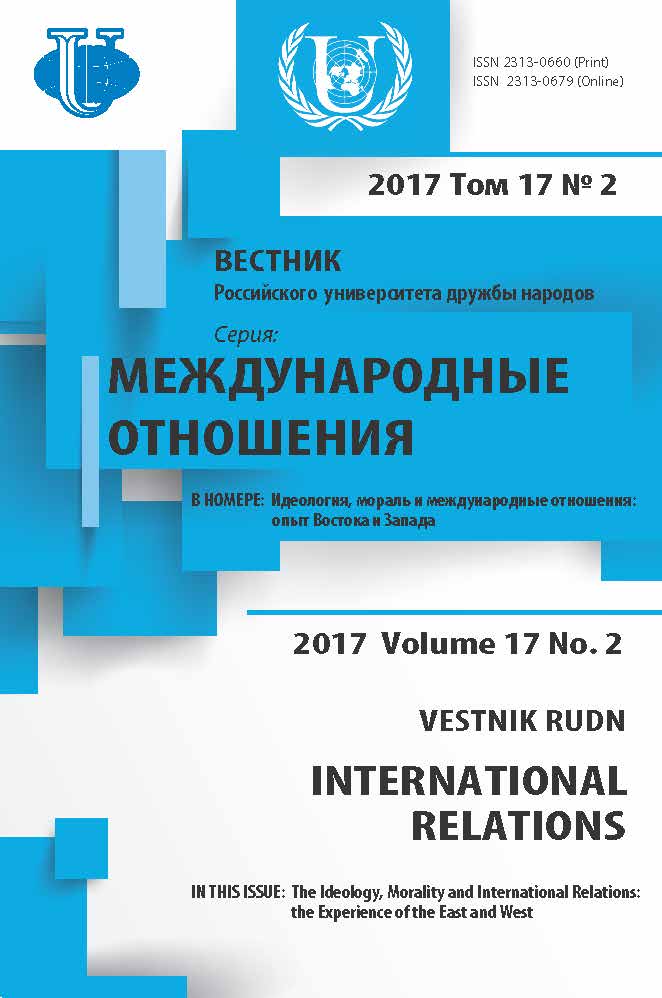The Journal “Geopolitica” and Formation of the Italian Geopolitical School
- 作者: Shepelev M.A.1
-
隶属关系:
- South-Western State University
- 期: 卷 17, 编号 2 (2017): The Ideology, morality and international relations: the experience of the East and West
- 页面: 325-338
- 栏目: 世界和安全
- URL: https://journals.rudn.ru/international-relations/article/view/16067
- DOI: https://doi.org/10.22363/2313-0660-2017-17-2-325-338
如何引用文章
全文:
详细
The article reveals the origins, methodological features and the process of institutionalization of Italian geopolitical school, place and role of the journal “Geopolitica” in this process. The article analyzes the characteristics of Italian geopolitical perception of the world and its geostrategic priorities, formulated by the representatives of the Italian geopolitical schools in the period of its formation in 20-40-ies of the XX century (the Mediterranean - Mare nostrum, Euroafrica). The source of the formation of the Italian geopolitical school was the intellectual influence of irredentism un the age of the Risorgimento. The process of its formation was correlated with the formation of the modern national school of geographical science, in which was dominated the perception of geography as “utilitarian science” and developed the direction of “dynamic political geography”. Its specifical features was the “antideterminism” and “geographic humanism”, the recognition that the environment does not have absolute power over society, but political will is a determining factor in anthropogeographical area. The institutionalization of Italian political school promoted the creation of several research centres in the 20-30-ies and publishing from January 1939 to December 1942 magazine “Geopolitica”. The draft edition of this magazine received support from the minister of national education Giuseppe Bottai, it was headed by Professor Giorgio Roletto and his disciple, Ernesto Massi. Italian geopolitics maintained close ties with their German colleagues, but they were theoretically justified differences between “Latin” and “German” geopolitical worldviews. Unlike the German geopolitics, the concept of “living space” was used primarily in the economic sense, but it was not used in a racial-demographic sense. Italian geopolitics acted against the world order enshrined in the Treaty of Versailles, because it was protected only a “rich nation” and discriminated “the proletarian nation”, which include Italy. They considered England as the main enemy of Italy, as “new Carthage”. For fighting against England was proposed to build friendly relations with Spain, Turkey and the Arab world, which should create conditions for the implementation of an ambitious project Euroafrica as a large space under the auspices of Italy. This project was considered as the Italian version of the “Monroe doctrine”. First of all, italian geopolitics sought to regain control of Italy over the North-Eastern Africa and on Terra irredenta (both shores of the Adriatic with Dalmatia and Albania, Malta, Corsica, Nice, Savoie and the Swiss Canton of Ticino, where many Italian compatriots was lived).
参考
- Almagià, R. (1936). Elementi di geografia politico-economica. Milano: Giuffré
- Almagià, R. (1923). La geografia politica. Considerazioni metodiche aul concetto e sul campo di studio di questa scienza. L’Universo, 10, 751-768
- Bonomi, E. (1942). Il problema della Grande Asia. Quaderni di cultura politica, Serie XII, 3. Roma: I.N.C.F
- Cantalupo, R. (1941). L’America e le Americhe. Storia e Politica Internazionale
- Carelli, G. (1941). Dalmazia e i suoi confine. Geopolitica, III (5), 243-249
- Chersi, L. (1940). I problemi geopolitici del Mediterraneo. Geopolitica, II (5), 214-215
- D’Agostino Orsini di Camerota, P. (1934). Eurafrica: L'Africa per l'Europa, l'Europa per l'Africa. Roma: P. Cremonese
- D’Agostino Orsini di Camerota, P. (1926). L’Italia nella politica Africana. Bologna: Capelli
- Dodds, K. & Atkinson, D. (Eds.). (2003) Geopolitical traditions. A century of geopolitical thought. London: Taylor & Francis e-Library
- Giuliani, G., & Lombardi-Diop, С. (2013). Bianco e nero: storia dell’identità razziale degli italiani. Firenze: Le Monnier
- Lorot, P. (1997). Storia della Geopolitica. Trieste: Asterios
- Losano, M. G. (2011). La geopolitica del Novecento. Dai Grandi Spazi delle dittature alla decolonizzazione. Milano: Bruno Mondadori
- Magugliani, L. (1942). Il Mediterraneo centro geopolitico del blocco continentale Euro-Asio-Africano. Geopolitica, IV (11), 495-504
- Marchi, L. de. (1929). Fondamenti di geografia politica. Padova: Cedam
- Massi, E. (1939). Democrazie, colonie e materie prime. Geopolitica, I (1), 17-35
- Massi, E. (1931). Geografia politica e geogiurisprudenza. La Coltura Geografica, 2, 81-102
- Massi, E. (1986). Geopolitica: dalla teoria originaria ai nuovi orientamenti. Bollettino della Società Geografica italiana. Serie XII, III (1-6)
- Massi, E. (1992). Il contributo della geopolitica alla comprensione del mondo moderno. Partecipare. Rivista di studi corporativi, XXII (2), 128-145
- Massi, E. (1940). Problemi mediterranei. Geopolitica, II (12), 331-340
- Mussolini, B. (1935). Scritti e discorsi. Vol. IХ. Scritti e discorsi dal Gennaio 1934 al 4 Novembre 1935. Milano: Hoepli
- Pess, R. (1940). Aspetti geopolitici dell’Albania. Geopolitica, II (1), 9-16
- Pozzani, S. (1941). Continentalità o regionalità nell’America Latina. Storia e Politica Internazionale
- Roletto, G. (1929). La geografia come scienza utilitarian. In: “Discorso inaugurale dell’a а. 1928-1929”, Regia Università degli Studi economici e commerciali di Trieste, pp. 3-20
- Roletto, G. (1937). Le tendenze geopolitiche continentali e l'asse Eurafrica. Milano: Mondadori
- Roletto, G., & Massi, E. (1931). Lineamenti di Geografia Politica. Trieste: Università di Trieste
- Romagnoli, L. (2002). La rivista “Geopolitica” (1939-1942) di Giorgio Roletto ed Ernesto Massi. Atti del XXVIII Congresso Geografico Italiano (Roma, 18-22 giugno 2000), Roma
- Sinibaldi, G. (2010). La geopolitica in Italia (1939-1942). Padova: Libreria Universitaria
- Toniolo, A. R. (1940). L’unità economica e politica del Mediterraneo. Geopolitica, II (12), 165-169
- Vinci, A. (1990). “Geopolitica” e Balcani: l’esperienza di un gruppo di intellettuali in un ateneo di confine. Società e Storia, XIII (47), 87-127








